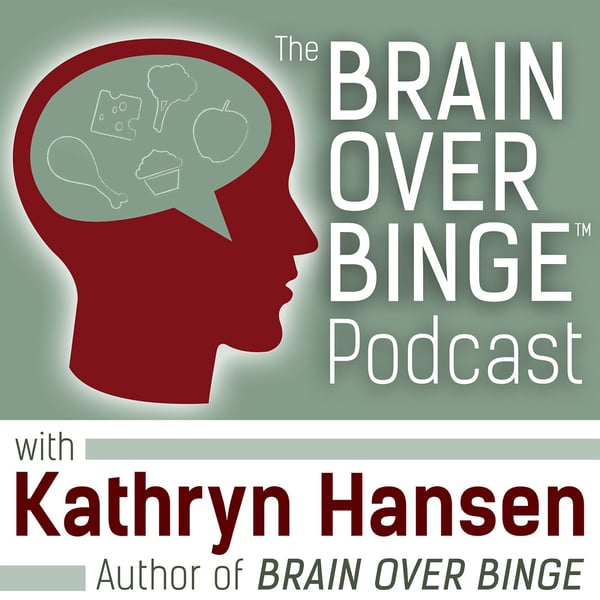Ep. 190: Supporting Your Nervous System to Support Recovery
Brain over Binge Podcast
Kathryn Hansen
4.6 • 785 Ratings
🗓️ 27 September 2025
⏱️ 45 minutes
🧾️ Download transcript
Summary
I talked with Dr. Aimie Apigian, author of the Biology of Trauma, about how trauma impacts the body and nervous system, and how that can create challenges in recovery. She explains how trauma healing creates more safety in the body and nervous system, which gives you more access to your decision-making abilities, and therefore supports recovery.
Dr. Aimie shares insights from her medical expertise and personal experience, and also discusses how a trauma-informed approach helped her overcome her own binge eating issue. If you tend to binge during times of high anxiety or dysregulation—even when you know it won’t help—this episode is for you.
Get the FREE 30-day Inspiration Booklet
Learn more about Dr. Aimie Apigian:
Get the book: The Biology of Trauma
BiologyofTrauma.com
5 Day Nervous System Reset
Brain over Binge resources:
Get personalized support with one-on-one coaching or group coaching
Subscribe to the Brain over Binge Course for only $18.99 per month
Get the Second Edition of Brain over Binge on Amazon and Audible, BarnesandNoble.com, Apple iBooks, or Kobo.
Get the Brain over Binge Recovery Guide
Disclaimer: *The Brain over Binge Podcast is produced and recorded by Brain over Binge Recovery Coaching, LLC. All work is copyrighted by Brain over Binge Recovery Coaching, LLC, and all rights are reserved. As a disclaimer, the hosts of the Brain over Binge Podcast are not professional counselors or licensed healthcare providers, and this podcast is not a substitute for medical advice or any form of professional therapy. Eating disorders can have serious health consequences and you are strongly advised to seek medical attention for matters relating to your health. Please get help when you need it, and good luck on your journey.
Transcript
Click on a timestamp to play from that location
| 0:00.0 | Hey, I'm Dr. Z and I'm a neurosurgeon. |
| 0:02.2 | So that means long hours, early rounds, late nights, and everything in between. And through it all, I wear figs. They're comfortable when it counts and functional when I need them the most. So where do you wear your figs? On shift, on call, on the couch and the break room listening to this podcast, wherever it is, they fit right in. And now listeners of this podcast can get 15% off their first order. |
| 0:22.9 | Just head to Wherefigs.com and use code FigsRX at checkout. |
| 0:26.7 | That's wherefigs.com code FigsRX. |
| 0:35.0 | Welcome to the Brain Over Binge Podcast, where you learn a simple, brain-based approach to ending |
| 0:39.6 | binge eating. I'm your host, Catherine Hansen. I'm the author of Brain Over Binge and the |
| 0:44.5 | Brain Over Binge Recovery Guide. My goal on this podcast is to help you have freedom from the |
| 0:49.1 | struggle with food in the most efficient way possible, so that you don't get lost in emotional |
| 0:53.7 | analysis or |
| 0:54.7 | endless recovery work. And to help with that, I often bring in guests to share different |
| 0:58.8 | strategies and ideas so that you can discover what uniquely helps you and brings you closer |
| 1:03.9 | to complete recovery. Today, I'm honored to speak with Dr. Amy Epigion about how trauma |
| 1:09.2 | impacts our body and our nervous system and how that can |
| 1:12.6 | create challenges in recovery, as well as how trauma healing can create safety in the body and in the |
| 1:18.5 | nervous system, which gives you more access to your decision-making abilities and therefore |
| 1:23.1 | supports recovery. Dr. Amy is a double board certified physician in preventative and addiction |
| 1:28.6 | medicine with master's degrees in biochemistry and public health. She has developed the biology of |
| 1:34.0 | trauma model, which is a framework for addressing how overwhelming experiences become rooted in our |
| 1:39.7 | biology, not just in our minds. What makes Dr. Amy's work especially unique is that it's grounded |
| 1:45.2 | not just in science, but in her own lived experience. After adopting a child with a history of trauma |
| 1:51.1 | and then experiencing her own health breakdown, she realized firsthand how deeply trauma can shape a person, |
| 1:57.6 | but she also saw that it's possible to heal. And she also used these trauma-informed |
... |
Please login to see the full transcript.
Disclaimer: The podcast and artwork embedded on this page are from Kathryn Hansen, and are the property of its owner and not affiliated with or endorsed by Tapesearch.
Generated transcripts are the property of Kathryn Hansen and are distributed freely under the Fair Use doctrine. Transcripts generated by Tapesearch are not guaranteed to be accurate.
Copyright © Tapesearch 2025.

